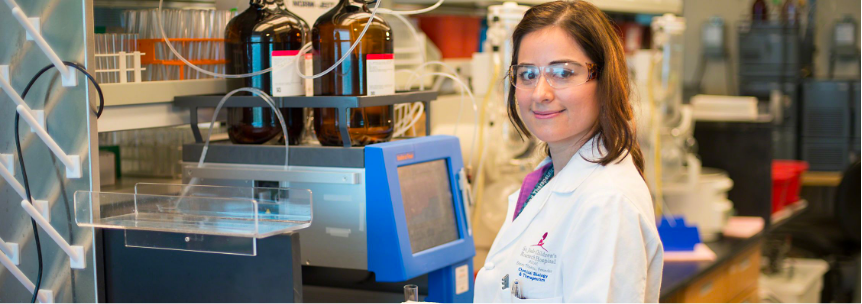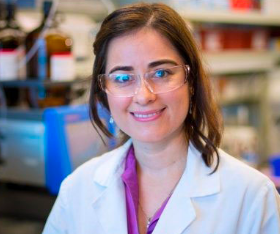Fatima Rivas, Ph.D.
Fatima Rivas
Assistant Faculty Member
St. Jude Children’s Research Hospital
B.S., Chemistry, California State University-Dominguez Hills
Ph.D., Organic Chemistry, University of California, San Diego
Fatima Rivas received her Ph.D. in organic chemistry in 2006 and later found her current job at St. Jude Children's Research Hospital while attending a technical meeting held by SACNAS (Society for the Advancement of Chicano and Native Americans).
Rivas is an assistant faculty member in the Department of Chemical Biology and Therapeutics at St. Jude Children’s Research Hospital. As part of St. Jude’s mission to find new treatments for cancer and catastrophic pediatric diseases, the Rivas laboratory isolates, characterizes, and synthesizes novel natural products from various natural sources. These compounds are tested for their potential to treat a broad range of cancers and infectious diseases.

Careful planning. I follow the old carpenter’s rule: Measure twice, cut once.
Typical day on the job:
- Planning experiments: 30%
- Running experiments: 15%
- Meetings: 20%
- Managing other people: 15%
- Writing papers/grants: 20%
Work environment:
My lab is divided into two sections, chemistry and biology. The chemistry area has chemical hoods, which are busy work spaces where chemists make molecules and purify compounds. We also do natural product extractions in this section. The biology section is much cleaner area where RNA, DNA, and protein work is carried out. We also have access to a laminar hood where we take care of the cell culture work.
Along with the usual lab equipment, we are fortunate to have some very useful specialized instruments that are unusual to see in an academic lab. Two instruments we use extensively are our ultra-performance liquid chromatography-mass spectrometer (UPLC-MS) and an Isolera FLASH purification system.
Work schedule:
I work every day except Saturdays. During the week, I like to be here from 9 a.m. until 7-8 p.m, depending on the experiments that I am running that day.
Tools you can’t live without:
My go-to tools are NMR, mass spectrometry, and SciFinder Scholar.
Best productivity trick:
Careful planning. I follow the old carpenter’s rule: Measure twice, cut once.
Best career advice you’ve received:
Stay focused and find a good mentor.
Skills or talents that make you a good fit for your job:
I am a curious person, and extremely competitive. I like to challenge myself to do better.
Essential habit you wish you’d started earlier:
My planning strategies—namely, beginning each project with the end in mind.
Favorite ACS resource:
The ACS local sections and student chapters have been a great resource. I have had a sense of community with my ACS student chapter during different stages in my life as an undergraduate. Now that I’m in Memphis, I’ve been attending events held by the local section. Compared to southern California, where I did my graduate and postdoctoral work, in Memphis the ACS community is smaller, and in many ways more tight-knit. The smaller size makes it easier to meet all of the other members and network.


